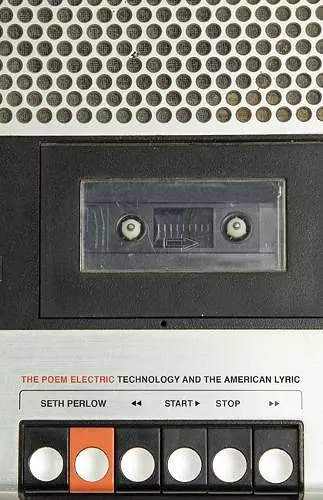The Poem Electric
Technology and the American Lyric
Format:Paperback
Publisher:University of Minnesota Press
Published:18th Dec '18
Should be back in stock very soon

An enlightening examination of the relationship between poetry and the information technologies increasingly used to read and write it
Many poets and their readers believe poetry helps us escape straightforward, logical ways of thinking. But what happens when poems confront the extraordinarily rational information technologies that are everywhere in the academy, not to mention everyday life?
Examining a broad array of electronics—including the radio, telephone, tape recorder, Cold War–era computers, and modern-day web browsers—Seth Perlow considers how these technologies transform poems that we don’t normally consider “digital.” From fetishistic attachments to digital images of Emily Dickinson’s manuscripts to Jackson Mac Low’s appropriation of a huge book of random numbers originally used to design thermonuclear weapons, these investigations take Perlow through a revealingly eclectic array of work, offering both exciting new voices and reevaluations of poets we thought we knew.
With close readings of Gertrude Stein, Frank O’Hara, Amiri Baraka, and many others, The Poem Electric constructs a distinctive lineage of experimental writers, from the 1860s to today. Ultimately, Perlow mounts an important investigation into how electronic media allows us to distinguish poetic thought from rationalism. Posing a necessary challenge to the privilege of information in the digital humanities, The Poem Electric develops new ways of reading poetry, alongside and against the electronic equipment that is now ubiquitous in our world.
"What happens to the lyric imagination in our new ‘computational environment’? Seth Perlow confronts a central paradox of postmodernity: a poem, on the one hand understood as ‘a small (or large) machine made of words’ (William Carlos Williams), is, on the other, devoted to resisting the inherent rationalism of that machine. Indeed, the ‘afterlife of the lyric,’ as Perlow argues in a series of fascinating case studies ranging from Emily Dickinson to Jackson Mac Low and Amiri Baraka, is one of lyric exemption—the resistance to absorption into normative discourse channels. Frank O’Hara’s poems, for example, may well claim to be ‘like’ telephone calls, but their actual articulation is one of depersonalization and replacement rather than imitation. Casting a wide net, The Poem Electric is a highly original investigation of how ‘electronics enable poets and their readers to animate and rework, rather than reject and surpass, familiar lyric norms.’"—Marjorie Perloff, author of Radical Artifice and Unoriginal Genius
"Seth Perlow presents a magnificent challenge to the current fashion of ‘big data’ and mathematized literary analysis. The Poem Electric shows how qualitative, lyric intensities embody dispositions that are of indispensable value to us, and which are in productive tension with the world of screens and memes that we inhabit. It represents a wonderful challenge to so many of our assumptions about the value of technology to the humanities and the place of the lyric in our technologized lifeworlds."—Joel Nickels, author of World Literature and the Geographies of Resistance
"By examining the ‘afterlives of the lyric’ through their relation to modern positivism—or, more accurately, the ‘equipment’ of rationalism—Seth Perlow ventures into territory rarely visited by theorists and critics. He seeks to identify the rationalized ‘objecthood’ of the lyric poem by pairing it with a series of electronic tools. He does so by repeatedly tracing a dialectical movement by which poetry’s ‘exemption from rationalism’ is exposed as a fallacy by its transactions with various devices and emblems of techno-rationalism: digital archives of audio and visual files, for example, or computer-generated lists of random numbers. Perlow’s critical anatomies can produce startling effects, as when his examination of the figure of the telephone in Frank O’Hara’s poetry reveals not O’Hara’s ebullient sociality (as we have been taught to believe), but a disturbing condition of anonymity and a-sociality. Remarkable for its close reflections and readings of unfamiliar texts, The Poem Electric helps to articulate a field of compelling interest."—Daniel Tiffany, author of Toy Medium: Materialism and Modern Lyric
"Instead of emphasizing quantitative data and empirically oriented interpretive methods, Perlow prefers to hone in on, “electronics’ messier, more complex influences upon how people read and write.” Whereas the Digital Humanities tends to privilege a machine’s ability to render literary texts as informational fields, Perlow’s approach—focusing on how writers and readers interact with literary equipment—is one that expands critical lenses and realms of investigation thus far practiced in that academic discipline."—Rain Taxi
ISBN: 9781517903664
Dimensions: 216mm x 140mm x 38mm
Weight: unknown
296 pages